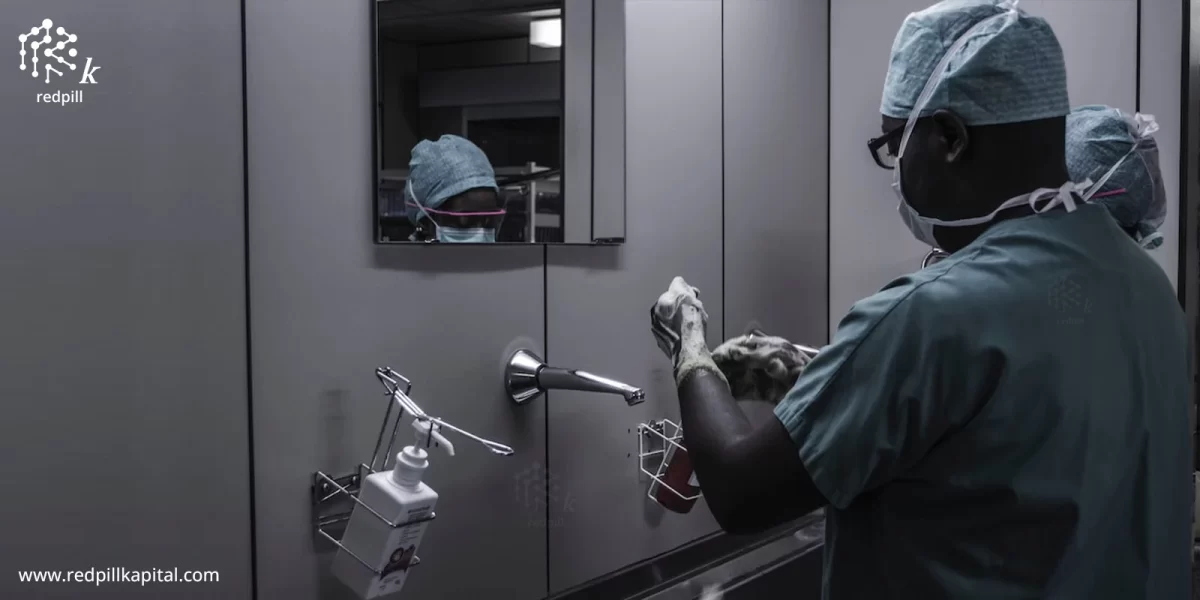Medical pros must take into consideration their fiscal future, particularly in times of economic instability, and seek out appropriate investment advice. One area that can offer significant potential returns is real estate investing. This post will look into the advantages and dangers of real estate investments that are specifically tailored for medical practitioners.
We will delve into developing a comprehensive strategy that aligns with your unique financial goals while considering factors such as risk tolerance and time horizon. Additionally, you’ll learn how to identify suitable properties for your investment portfolio, ensuring they meet your specific criteria.
Lastly, we will discuss techniques to maximize returns on your real estate investments through effective management practices and strategic decision-making processes based on sound medical professional investment advice.
Table Of Contents:
- Understanding the Benefits of Real Estate Investing for Medical Professionals
- Analyzing the Risks of Real Estate Investing for Medical Professionals
- Developing a Real Estate Investment Strategy for Medical Professionals
- Finding the Right Properties for Your Investment Portfolio
- Maximizing Returns on Your Real Estate Investments
- Conclusion
1. Understanding The Benefits Of Real Estate Investing For Medical Professionals
Real estate investing offers numerous benefits to medical professionals, making it an attractive option for those looking to build wealth and secure their financial future. In this section, we will discuss some of the key advantages that real estate investments can provide.
A. Wealth Building Through Appreciation And Cash Flow
One of the primary reasons many medical professionals choose to invest in real estate is its potential for appreciation. As property values increase over time, so does your equity in the investment. Additionally, rental properties generate a steady stream of income through rent payments from tenants, which can help supplement your earnings as a physician or other healthcare professional.
B. Diversification And Risk Management
To maximize long-term financial stability, it is important to diversify your investment portfolio by adding real estate investments alongside stocks, bonds and other assets. By adding real estate investments to your portfolio alongside stocks, bonds, and other assets, you reduce exposure to market fluctuations while taking advantage of different growth opportunities across various sectors (source). This diversification strategy helps protect against economic downturns that may impact one asset class more than others.
C. Tax Advantages
- Mortgage Interest Deduction: Mortgage interest paid on investment properties is tax-deductible up to certain limits (source). This deduction reduces taxable income from rental activities.
- Depreciation: Real estate investors can claim depreciation on their rental properties, which allows them to deduct a portion of the property’s cost over time. This reduces taxable income and provides tax savings (source).
- 1031 Exchange: A 1031 exchange, also known as a like-kind exchange, enables real estate investors to defer capital gains taxes when selling an investment property by reinvesting the proceeds into another qualifying property.
D. Hedge Against Inflation
Real estate can act as a safeguard against inflation’s effects on purchasing power, enabling you to maintain the value of your assets. As inflation rises, so do rents and property values, providing increased cash flow and appreciation for your investment portfolio (source). This helps protect your wealth from being diminished by rising costs in other areas of life.
E. Control Over Investment Decisions
Unlike investing in stocks or mutual funds where decisions are often made by fund managers or dictated by market forces beyond your control, real estate investing allows you greater autonomy in managing your assets. You have the ability to choose properties that align with your goals and risk tolerance while making improvements that enhance value and increase returns on investment.
Having discussed the advantages of real estate investing for medical professionals, it is now important to comprehend the associated risks and how to reduce them. In the following part, we’ll take a look at potential dangers and outline techniques for managing them efficiently.
Real estate can be a potential source of diversification and long-term financial security for medical professionals. Before taking the plunge into real estate investing, it is critical to be aware of any potential risks associated with this type of venture.
Key Takeaway: Real estate investing offers medical professionals numerous advantages, such as wealth building through appreciation and cash flow, diversification for risk management, tax benefits like mortgage interest deductions and depreciation allowances, a hedge against inflationary pressures, plus the ability to make their own investment decisions.
2. Analyzing The Risks Of Real Estate Investing For Medical Professionals
As a medical professional, it’s essential to understand the risks associated with real estate investing and how to mitigate them. This section will discuss some common risks and provide tips on managing these challenges effectively.
A) Market Volatility
Real estate can be a tricky business, with prices shifting due to numerous elements such as the economy, interest rates and local market trends. To minimize exposure to market volatility, consider diversifying your investment portfolio across different types of properties (e.g., residential vs. commercial), locations (e.g., urban vs. rural), or even through crowdfunding platforms that pool investments from multiple investors.
B) Liquidity Risk
Liquidity risk refers to the difficulty in converting an asset into cash quickly without affecting its value significantly. Real estate is considered a relatively illiquid investment compared to stocks or bonds because selling a property may take time and involve additional costs like agent fees or closing expenses. To manage liquidity risk, ensure you have sufficient cash reserves before investing in real estate and avoid over-leveraging yourself by taking on too much debt.
C) Tenant-Related Issues
Renting out properties comes with potential tenant-related issues such as late rent payments, property damage caused by tenants, or disputes leading to legal actions against landlords (especially if landlord responsibilities are not met properly). Thoroughly screen prospective tenants using background checks and credit reports, and establish clear lease agreements outlining tenant responsibilities to minimize these risks.
D) Property Management
Managing a rental property can be time-consuming and challenging for busy medical professionals. Inadequate management may lead to vacancies, maintenance issues, or unhappy tenants. Look into employing a specialist property manager who can manage everyday activities, like collecting rent, doing repairs and communicating with tenants on your behalf.
E) Regulatory Risks
Real estate investments are subject to various local laws and regulations that govern zoning, building codes, taxes, and landlord-tenant relationships. Non-compliance with local laws can lead to costly penalties and legal repercussions for the real estate investor. Stay informed about relevant laws by consulting with real estate attorneys or joining local investor groups where experienced investors share their knowledge of regulatory requirements.
- Action Item: Research different types of properties (residential vs commercial), locations (urban vs rural), crowdfunding platforms for diversification purposes.
- Action Item: Ensure sufficient cash reserves before investing in real estate; avoid over-leveraging yourself with debt.
- Action Item: Thoroughly screen prospective tenants using background checks & credit reports; establish clear lease agreements outlining tenant responsibilities.
- Action Item: Consider hiring a professional property manager if managing rental properties is too time-consuming due to your medical profession demands.
- Action Item: Consult with real estate attorneys or join local investor groups for staying updated on relevant laws & regulations governing real estate investments.
Medical professionals must be aware of the potential dangers that accompany real estate investing in order to make prudent choices and obtain optimal returns. Having assessed the risks associated with real estate investments, it is now prudent to create a plan that caters specifically to medical professionals’ requirements.
Key Takeaway: As a medical professional, it is essential to be aware of the potential dangers associated with real estate investing and how best to minimize them. To do this effectively, you should diversify your investments across different types of properties and locations; ensure sufficient cash reserves before investing; screen tenants thoroughly; consider hiring property managers if managing rental properties is too time consuming due to your profession demands; and consult with legal professionals or join local investor groups for staying updated on relevant laws & regulations governing real estate investments.
3. Developing A Real Estate Investment Strategy For Medical Professionals
Creating a personalized real estate investment strategy is crucial to achieving your financial goals as a medical professional. Formulating an intentional plan can assist you in overcoming the intricacies of investing in real estate and guarantee that your decisions are judiciously made all through the process. To create an effective investment strategy, it is important to evaluate your financial situation.
A. Assessing Your Financial Situation
The first step in creating an effective investment strategy is assessing your current financial situation. This includes evaluating your income, expenses, savings, and debt levels. You should also take into account any future changes in income or expenses due to career advancements or family planning considerations.
B. Setting Clear Goals
Establishing clear goals for your investments will help guide your decision-making process and keep you focused on what’s important: building wealth through real estate investments over time while mitigating risks associated with market fluctuations buy-and-hold strategies. Consider both short-term objectives (e.g., generating rental income) and long-term aspirations (e.g., retirement planning).
- Rental Income: If generating passive rental income is one of your primary goals, focus on properties with strong cash flow potential such as multi-family units or single-family homes located near hospitals or universities.
- Appreciation: For those looking to build equity through property appreciation over time, prioritize markets experiencing consistent growth rates like major metropolitan areas with expanding job opportunities.
- Tax Benefits: Take advantage of tax benefits associated with real estate investing, such as depreciation deductions and capital gains tax exclusions on the sale of a primary residence.
C. Diversifying Your Portfolio
Diversification is key to managing risk in any investment portfolio, including real estate investments. By spreading your capital across different property types and geographic locations, you can reduce exposure to market fluctuations and enhance overall returns. Consider diversifying by:
- Property Type: Invest in various property types like single-family homes, multi-family units, commercial properties or even real estate investment trusts (REITs).
- Geographic Location: Explore opportunities in multiple markets – both local and out-of-state – to take advantage of regional economic trends while mitigating risks associated with localized downturns.
D. Leveraging Professional Expertise
Tapping into professional expertise can significantly improve your chances of success when investing in real estate. Working with experienced professionals like financial advisors, realtors, property managers or legal counsel will help ensure that you make informed decisions throughout the process.
In summary, developing a tailored real estate investment strategy for medical professionals involves assessing your financial situation; setting clear goals; diversifying your portfolio across different property types and geographic locations; leveraging professional expertise where necessary; understanding potential risks involved; maximizing returns through tax benefits among other factors discussed above.
Formulating a real estate investment plan tailored to medical professionals may be an effective way of attaining financial soundness and pension assurance. To maximize returns, it is important to find the right properties that fit your portfolio needs.
Key Takeaway: As a highly experienced medical professional, it’s essential to create an informed and diversified real estate investment strategy in order to maximize returns while mitigating risks. This involves assessing your financial situation, setting clear goals, diversifying across different property types and locations, leveraging expert advice where necessary, taking advantage of tax benefits available – all the steps for achieving success outlined above.
4. Finding The Right Properties For Your Investment Portfolio
When investing in real estate as a medical professional, it is essential to identify properties that fit your financial plan and investment objectives. This section will discuss various factors you should consider when searching for suitable properties, as well as some resources that can help streamline the process.
A. Property Type
The first step in finding the right property is determining which type of property best suits your needs and goals. Some popular options include:
- Single-Family Homes: These are standalone houses designed for one family, often considered an excellent starting point for new investors due to their lower price points and ease of management.
- Multifamily Properties: These consist of multiple residential units within one building (e.g., duplexes or apartment complexes), offering potential economies of scale and higher cash flow than single-family homes.
- Commercial Properties: Office buildings, retail spaces, or industrial facilities can provide significant income streams but may require more extensive knowledge about commercial leasing agreements and market trends.
B. Location
The location of a property plays a critical role in its long-term appreciation potential and rental demand. When evaluating locations, consider factors such as local job growth rates, school quality ratings, crime statistics, neighborhood amenities,,and access to public transportation or major highways.
Establish a budget that takes into account both initial expenses (e.g., down payment) and ongoing costs (e.g., mortgage payments). Research financing options, such as conventional loans or FHA mortgages, and consult a broker to discover the most suitable choice for your finances.
D. Property Condition & Renovation Potential
Evaluate the property’s current condition and its potential for renovation or improvement. Properties in need of repairs may offer better deals but can also require significant time and resources to bring up to standard. Consider working with a home inspector or contractor who can provide an accurate assessment of repair costs before making an offer.
E. Resources For Finding Investment Properties
Utilize various resources when searching for properties that meet your criteria:
- Real Estate Agents: Partnering with an experienced agent familiar with local market trends can help you find suitable properties more efficiently.
- Online Platforms: Websites like Zillow, Redfin,,and LoopNet (for commercial properties) allow you to search listings based on specific filters, such as price range, location, and property type.
- Auctions & Foreclosures: Auctions (both online and in-person) and foreclosure sales can present opportunities to purchase properties at below-market prices; however, they often come with additional risks due to limited information about the property’s condition.
Finding the right investment property requires careful research, patience, and diligence. By considering factors such as property type, location, budget constraints, financing options available while leveraging helpful resources like real estate agents or online platforms will significantly increase your chances of success in real estate investing.
In order to maximize returns on your real estate investments, it is essential to conduct thorough research and due diligence. With that in mind, let’s look at how you can maximize returns on your real estate investments.
Key Takeaway: To ensure you make a wise investment, take the time to thoroughly investigate factors such as location, budget and financing options. Do your due diligence by researching factors like location, budget and financing options while leveraging resources such as agents or online platforms – you’ll hit the jackpot in no time.
5. Maximizing Returns On Your Real Estate Investments
As a medical professional, you have put in the effort to generate your earnings and deserve to gain the greatest possible returns on your real estate investments. To maximize these returns, it is essential to understand various strategies that can help you leverage tax benefits, debt management, and other financial tools.
A. Leveraging Tax Benefits
Tax benefits are one of the most significant advantages of investing in real estate for medical professionals. By understanding and utilizing these benefits properly, you can significantly increase your investment’s overall return:
- Depreciation: As a property owner, you can deduct the depreciation of your rental property from your taxable income each year. This deduction offers an opportunity to lessen the expenses of owning a rental property while also reducing your tax obligation. Learn more about depreciation deductions from this Investopedia article.
- Mortgage Interest Deduction: Mortgage interest paid on loans used for acquiring or improving rental properties is generally deductible against rental income as well as passive activity losses (PALs). You can find more information about mortgage interest deductions through this comprehensive guide by Bankrate.
- 1031 Exchange: A 1031 exchange allows investors to defer capital gains taxes when selling an investment property if they reinvest those proceeds into another “like-kind” property within specific timeframes outlined by IRS guidelines. Read more about how a 1031 exchange works in this informative piece by Nolo.
B. Leveraging Debt Management
Using debt wisely can be a powerful tool for maximizing returns on your real estate investments. Here are some strategies to consider:
- Refinancing: Refinancing your mortgage at a lower interest rate or better terms can reduce monthly payments and free up cash flow, which you can then use to invest in additional properties or pay down existing debt faster. Learn more about the benefits of refinancing from this helpful article by Rocket Mortgage.
- Home Equity Line Of Credit (HELOC): A HELOC allows you to borrow against the equity in your property, providing funds that can be used for various purposes such as renovations, paying off high-interest debts, or investing in new properties. Read more about how HELOCs work and their potential advantages through this informative guide by Bankrate.
- Cash-Out Refinance: A cash-out refinance involves replacing your current mortgage with a new loan that has a higher balance than what is owed on the original loan. The difference between these two amounts is paid out as cash and can be used for various investment purposes like purchasing another rental property or making improvements to increase rent prices and property value.
Incorporating these strategies into your overall real estate investment plan will help maximize returns while minimizing risks associated with market fluctuations and economic uncertainty faced by medical professionals today.
Key Takeaway: This article provides medical professionals with strategies to maximize returns on real estate investments, such as leveraging tax benefits and debt management. By taking advantage of depreciation deductions, mortgage interest deduction, 1031 exchange opportunities and refinancing or cash-out refinance options through a HELOC (Home Equity Line of Credit), investors can make the most out of their investment dollars for maximum return on investment.
Conclusion
Medical professionals who are looking for investment advice can benefit greatly from real estate investing. With the right strategy, research and due diligence, medical professionals can maximize their returns on investments while minimizing risks associated with such an endeavor. Real estate investing offers medical professionals exclusive advantages which can aid them in making smart choices with regards to their financial planning and retirement readiness. Medical professional investment advice is key in order to ensure a secure future.
By Gurpreet Singh Padda, MD, MBA
www.redpillkapital.com
If you simply need more information. have questions, or want to discuss a specific deal, I’m always excited to help. Reach out to me at info@redpillkapital.com
If you are ready to start your journey to financial freedom but want specific additional educational materials, we have a course designed for physicians.








